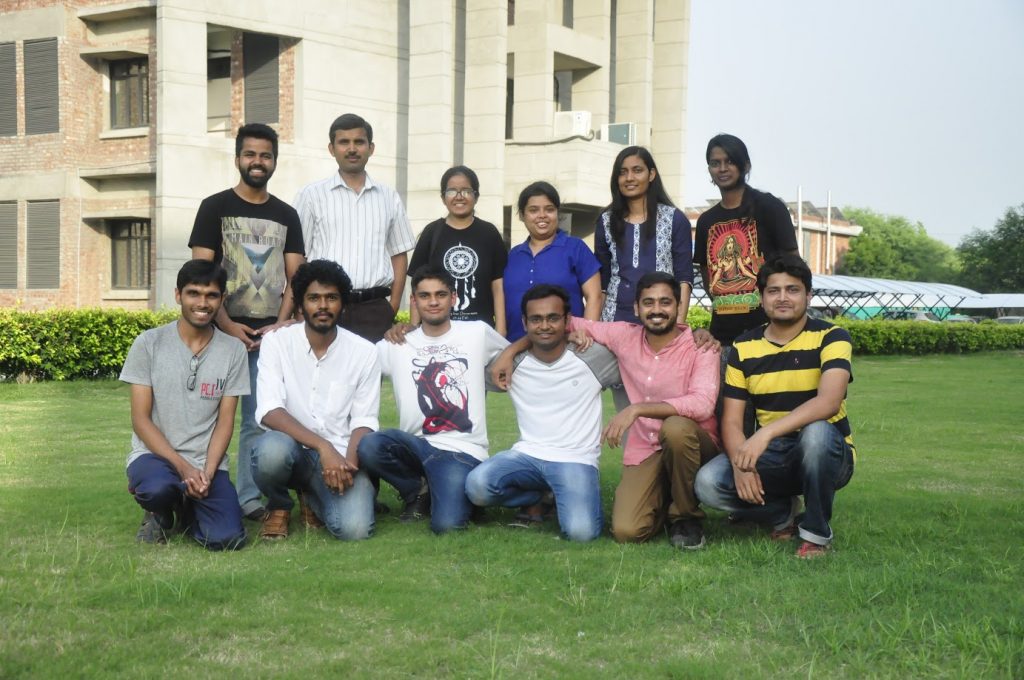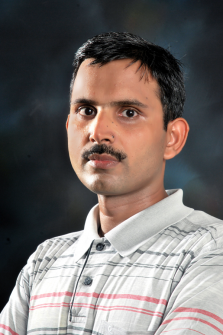Research summary
Group name: RNA Biology
Research Area: Ubiquitin-Related Modifiers and Regulation of Pre-mRNA Splicing
Overview:
Ubiquitin and ubiquitin-related proteins (Hub1, SUMO and related proteins; collectively referred to as UBL) are highly conserved, which share a typical ubiquitin fold, but with distinct surfaces. Using a set of dedicated enzymes, an UBL attaches through covalent linkages to its substrates that could be proteins, lipids or RNAs. The reversible nature of these modifications makes UBLs key regulators of multiple processes in the cell. A majority of UBLs also interact non-covalently with proteins harboring specific UBL-binding domains. Thus, UBLs determine fates of their targets either through proteasomal destruction or confer functional diversity to factors in DNA repair, recombination, ribosome biogenesis or cellular signaling in non-proteolytic ways.
UBLs are also reported to act at spliceosome – the catalyst that removes non-coding but regulatory parts (introns) and joins protein-coding parts (exons) from pre-messenger RNAs by the process of pre-mRNA splicing. Spliceosomes also perform alternative splicing to increases cellular repertoire of mRNAs to fulfill the demand of a larger proteome from a lower gene number. The composition of spliceosomes core is well studied, but regulatory factors that ensure constitutive and alternative splicing of nearly every gene in humans, for example, are not known. UBLs are known to modify spliceosomal proteins, but outcome of such modifications is not clear.
We study regulation of pre-mRNA splicing by UBLs and UBL-associated proteins. As UBLs and the process of pre-mRNA splicing are conserved from yeast to humans, we use approaches of molecular cell biology, biochemistry and genetics in budding yeast Saccharomyces cerevisiae and fission yeast Schizosaccharomyces pombe.
We have reported previously that the UBL Hub1 modifies spliceosomes by a non-covalent association with HIND-containing splicing factors and plays a critical role in alternative RNA splicing and splicing of pre-mRNAs containing introns with weak splice sites.

 We recently identified a UBL-containing protein Sde2 as a component of spliceosomes, which promotes splicing in an intron-specific manner in the fission yeast Schizosaccharomyces pombe. Sde2 is activated and incorporated into spliceosomes only after cleavage of the UBL by specific deubiquitinating enzymes. Our findings show that selected introns in pre-mRNAs are recognized differently by the spliceosome, wherein UBL-like regulatory factors become crucial for activation of certain splicing events.
We recently identified a UBL-containing protein Sde2 as a component of spliceosomes, which promotes splicing in an intron-specific manner in the fission yeast Schizosaccharomyces pombe. Sde2 is activated and incorporated into spliceosomes only after cleavage of the UBL by specific deubiquitinating enzymes. Our findings show that selected introns in pre-mRNAs are recognized differently by the spliceosome, wherein UBL-like regulatory factors become crucial for activation of certain splicing events.
Grants
- IISER Mohali: An institute established by the Ministry of Human Resource and Development (MHRD), Government of India.
- Max Planck Partner Group:The Max Planck Society, Germany, and the Department of Science and Technology (DST), India, jointly funds the partner group for research on Ubiquitin-Related Modifiers at IISER Mohali.
- Centre of Excellence, MHRD: The Ministry of Human Resource and Development (MHRD), Government of India funds the center for protein science, design and engineering (CPSDE) at IISER Mohali.
Honors and Awards
- Head, Max Planck – DST Partner Group, IISER Mohali (since 2013)
- Max Planck Institute of Biochemistry’s Junior Research Award for Outstanding Research in Biochemistry (2011)
- PhD Graduate Program of Goethe University of Frankfurt (2000-2002
Selected Publications
- Thakran, P., Pandit, P.A., Datta, S., Kolathur, K.K., Pleiss, J.A., and Mishra, S.K. (2017). Sde2 is an intron-specific pre-mRNA splicing regulator activated by ubiquitin-like processing. The EMBO Journal DOI 10.15252/embj.201796751.
- Fragkostefanakis,, Mesihovic, A., Simm, S., Paupière, M.J., Hu, Y., Paul, P., Mishra, S.K., Tschiersch, B., Theres, K., Bovy, A., Schleiff, E., Scharf, K.D. (2016). HsfA2 Controls the Activity of Developmentally and Stress-Regulated Heat Stress Protection Mechanisms in Tomato Male Reproductive Tissues. Plant Physiology 170: 2461-2477.
- Ammon, T., Mishra, S.K., Kowalska, K., Popowicz, G.M., Holak, T., and Jentsch, S. (2014). The conserved ubiquitin-like protein Hub1 plays a critical role in splicing in human cells. Journal of Molecular Cell Biology 6: 312-323.
- Mishra, S.K., Ammon, T., Popowicz, G.M., Krajewski, M., Nagel, R.J., Ares, M., Holak, T., and Jentsch, S. (2011). Role of the ubiquitin-like protein Hub1 in splice-site usage and alternative splicing. Nature (Article) 474: 173-178.
- Tripp, J*., Mishra, S.K*., and Scharf, K.-D. (2009). Functional dissection of the cytosolic chaperone network in tomato mesophyll protoplasts. Plant, Cell & Environment 32: 123-133. (*Co-first authors).
- Baniwal, S.K., Bharti, K., Chan, K.Y., Fauth, M., Ganguli, A., Kotak, S., Mishra, S.K., Nover, L., Port, M., Scharf, K.-D., Tripp, J., Zielinski, D., and von Koskull-Doering, P. (2004). Heat stress response in plants: a complex game with chaperones and more than 20 heat stress transcription factors. Journal of Biosciences 29: 471–487 (Review).
- Mishra, S.K., Tripp, J., Winkelhaus, S., Tschiersch, B., Theres, K., Nover, L., and Scharf, K.-D. (2002). In the complex family of heat stress transcription factors, HsfA1 has a unique role as master regulator of thermo tolerance in tomato. Genes & Development 16: 1555-1567.
- Nover, L., Bharti, K., Doering, P., Mishra, S.K., Ganguli, A., and Scharf, K.-D. (2001). Arabidopsis and the heat stress transcription factor world: how many heat stress transcription factors do we need? Cell Stress & Chaperones 6: 177-189 (Review).
Group
| Current Members | Position (Fellowship) |
| Prashant Pandit, M.Sc. | PhD Fellow (UGC) |
| Poonam Thakran, M.Sc. | PhD Fellow (DST-INSPIRE) |
| Kiran Kumar Reddy, M.Pharm. | PhD Fellow (ICMR) |
| Poulami Choudhuri, B.Sc. | Integrated PhD Fellow |
| Rakesh P. BTech | PhD Fellow |
| Sumanjit Datta | BS-MS Student |
| Karan Chaudhary | BS-MS Student |
| Alumni | Position Held |
| Sabbir Khan, PhD | Post-Doctoral Fellow |
| Anmoldeep Randhawa, PhD | Post-Doctoral Fellow |
| Ankita Das | Project fellow |
| Deepak Saroha | MS student |
| Sukriti Vidyarthi | MS Student |
| Ane Nishitha | MS Student |
| Manu Sanjeev | MS student |
| Sandra U.S. | MS student |


